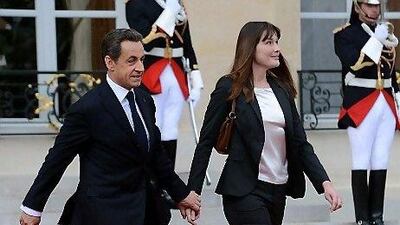CAVALIÈRE, FRANCE // Across the road from the entrance to Carla Bruni-Sarkozy's family retreat on a stunning promontory of the French Riviera, tourists have gathered for each visit since her 2008 marriage to a man then feeling his way as French president.
Necks stretched, cameras ready, they could be sure of catching the fitness-obsessed Nicolas Sarkozy on his routine cycle rides.
Or was the greater attraction the prospect of seeing his wife, one of the most photographed women in France, at this leafy spot outside the small resort of Cavaliere?
The world has a fascination with Mrs Bruni-Sarkozy that is strong enough to survive her husband's loss of his own raison d'être of the past five years.
And one of the key obstacles standing between the ousted president and the obscurity he professed to crave in the event of defeat to François Hollande is Carla.
Few would exclude the possibility that her activities will become dominant in the relationship. At 43, she may feel her modelling years are behind her. But with only one album recorded since their marriage - and intriguingly titled Comme Si Rien N'Etait, or "as if nothing had happened" - there could be a lot more music in her.
As the strong likelihood of defeat began to concentrate Mr Sarkozy's mind in the early months of this year, he presented a philosophical face to the world
Aware that he was struggling to shrug off the unpopularity of his presidency, he made it clear he would leave public life if beaten. "I've had a great life in politics," he said in a joint RCM radio and BFM television interview in March. "I would do something else. What else, I do not know."
This, along with the suggestion that such a new life would represent a "big change", confirmed remarks, intended to be off the record, to correspondents during a visit to the French overseas region of Guiana in January. "I'm 56," he said then. "I have been in politics for 35 years. But I have a profession; I would change my life completely and you would hear nothing more of me."
That profession, put on hold three decades ago as he began his rise the top of centre-right French politics, is law.
Mr Sarkozy was a successful advocate, specialising in family and business practice. Among former clients who remember him with admiration is Sylvio Berlusconi, three times Italian prime minister and also a casualty of the political turmoil that has swept Europe during the financial crisis.
But he may have other dealings with the law in the months and years ahead. Next month, he becomes "justiciable", the loss of presidential immunity making him as answerable to the law as any other citizen.
There are three matters, all concerning alleged illegal payments for election campaigns and all dating from before he took office, in which investigators may now turn their attentions to the former president, as a witness or potential defendant.
Mr Sarkozy has been accused of receiving, directly or indirectly, cash stuffed into envelopes from France's richest family, the Bettencourts, to help towards the cost of standing successfully for office in 2007. A report by the investigative website Mediapart alleged a few days before the May 6 second round of the 2012 elections that the Libyan regime of the late Col Muammar Qaddafi had set aside €50 million (Dh234m) for the same purpose.
And former members of Mr Sarkozy's circle have been caught up in judicial inquiries into the "Karachi affair", involving arms sales, kickbacks and political intrigue and leading to the deaths of 11 French construction workers in a 2002 bombing in the Pakistani city. Mr Sarkozy was the campaign spokesman for Edouard Balladur, whose 1995 presidential bid supposedly received money from the commissions in question.
Either Mr Sarkozy is the victim of vile smears, as he indignantly asserts, or he has awkward questions to answer. Either way, he could face an uncomfortable series of legal battles ahead, hardly consistent with a desire to exit the limelight.
When the outgoing president, sometimes given the sobriquet Little Napoleon by the media, handed over power to the new incumbent on Tuesday, the body language suggested sadness, but perhaps also relief. There are clearly aspects of high office neither he nor his wife will miss.
Mr Hollande is already experiencing teething troubles. A leading socialist party colleague, Martine Aubry, overlooked for the job of prime minister, has refused to serve in his government. The man who did get the post, Jean-Marc Ayrault, turns out to have an old criminal conviction for favouritism as mayor of the western city of Nantes.
For all Mr Ayrault's pleading that it was a technical offence, involving no personal enrichment, such a high profile early appointment with a tainted record sits uneasily with Mr Hollande's campaign pledge to surround himself only with people of exemplary background.
And tabloid knives are being brandished at Mr Hollande's partner, Valerie Trierweiler, whose unflattering nickname "rottweiler" is now common currency after being used by an irreverent politician. The disrespectful treatment of Ms Trierweiler reflects the increasingly robust nature of the French media; she is, after all, an accomplished magazine and television journalist and is certain to seek a meaningful role. Carlo Bruni-Sarkozy may be portrayed as a jetsetting femme fatale but looked maternal and serene - one British columnist unkindly chose the phrase ''decidedly dowdy'' - at the Elysée ceremony. Ms Trierweiler, on the day more glamorous, seems to have her work cut out - if she is to overcome hostile early impressions.
As the Sarkozys seek relaxation and time for reflection - a short stay in Cavaliere followed by a much longer one in Morocco if reports are accurate - they will perhaps hope that while anonymity is not on offer, they may at least be spared the level of scrutiny their successors, as head of state and first lady, must now expect.


